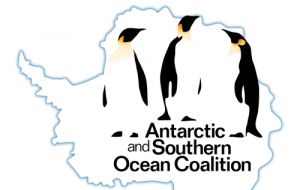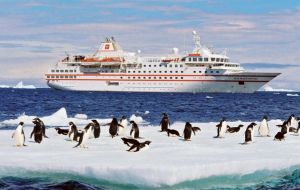MercoPress. South Atlantic News Agency
Polar Code does not adequately protect Antarctic environment from shipping, says ASOC
 ASOC believes that an effective Polar Code should require vessels sailing in Antarctic waters to completely stop discharging raw sewage.
ASOC believes that an effective Polar Code should require vessels sailing in Antarctic waters to completely stop discharging raw sewage.  Demands practices which prevent the introduction of invasive alien species, specially referred to existing guidance on ballast water discharges in Antarctica (Pic IAATO)
Demands practices which prevent the introduction of invasive alien species, specially referred to existing guidance on ballast water discharges in Antarctica (Pic IAATO) The Antarctic and Southern Ocean Coalition voiced its disappointment over the lack of any significant new provisions in Part II of the Polar Code that would adequately protect the Antarctic environment from shipping. The London-based UN International Maritime Organization (IMO) on Friday adopted Part II of the Polar Code concerning pollution prevention.
Part II of the newly adopted Code addresses pollution discharges from ships such as oil, chemicals, sewage and rubbish while at sea and is expected to strengthen existing regulations particularly in the Arctic. It will compliment Part I, which addresses safety of shipping in polar regions and was adopted towards the end of 2014. Both Parts of the Code are expected to take effect from the beginning of 2017.
“While ASOC welcomes the adoption of Part II of the Polar Code on pollution prevention and that Arctic waters will now receive the same protection as already in place for Antarctica, we remain extremely disappointed that the International Maritime Organization has missed a unique opportunity to improve protection of Antarctic waters”, said Sian Prior, Shipping Advisor to the Antarctic and Southern Ocean Coalition.
Prior continued: “ASOC believes that an effective Polar Code should require vessels sailing in Antarctic waters to:
Completely stop discharging raw sewage. Under Part II, raw sewage discharge will continue to be allowed beyond 12nm from land, ice shelves or fast ice and as far as practicable from areas of ice concentration exceeding 1/10 (i.e. 1 in 10) ice cover.
Be required to introduce practices which to prevent the introduction of invasive alien species. Part II refers to existing guidance on ballast water discharges in the Antarctic and global guidelines on hull fouling, but fails to introduce any new mandatory or voluntary requirements to prevent or minimize the risks of introducing invasive alien species.
Be adequately equipped and crews trained to deal with minor spills. While some vessels will carry the necessary equipment, the Code does not explicitly spell out what should happen in the event of an oil or chemical spill. The inclusion of specific provisions in the Code could have tailored existing requirements to the special needs of polar waters.”
Founded in 1978, ASOC is the only non-governmental organization working full time to preserve the Antarctic continent and its surrounding Southern Ocean. A coalition of over 30 NGOs interested in Antarctic environmental protection, ASOC represents the environmental community at Antarctic governance meetings and works to promote important Antarctic conservation goals.



Top Comments
Disclaimer & comment rules-

Read all commentsprotect the Antarctic environment from shipping,
May 16th, 2015 - 08:33 pm 0just ban all the ships,
the shipping companies will soon tidy up after themselves,
just a watery thought.
Commenting for this story is now closed.
If you have a Facebook account, become a fan and comment on our Facebook Page!